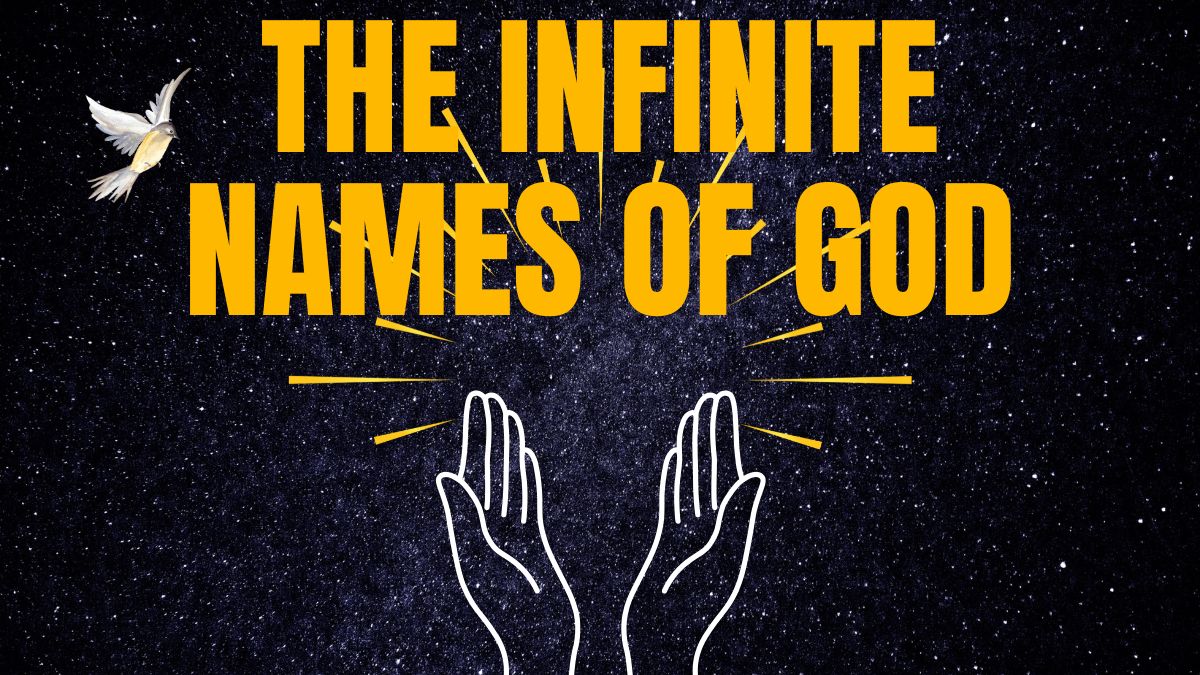How religion, spirituality, and mysticism use endless names to capture the divine
People have searched for words to explain the inexplicable for generations and throughout civilizations. There are numerous names for the divine in practically every faith. Some are artistic phrases that suggest mysteries that words cannot explain, while others are titles of authority or whispers of intimacy.
It is no coincidence that there are so many names. It illustrates how humans must approach the universe from a variety of perspectives. A single word cannot adequately capture the scope of the divine. Rather, searchers, mystics, and believers have developed an infinite vocabulary that grows with time, society, and individual experience.
The infinite names of God show us how naming is not just about labeling. It is about relationship, reverence, and the attempt to bridge the gap between the human and the eternal.
Names as Access Points to the Divine
By acting as entry points, names allow worshippers to approach things that would otherwise seem untouchable. In Judaism, for example, God is referred to by names such as Elohim, Adonai, and the silent Trinity, each of which denotes one particular aspect of the divine presence. The 99 Names of Allah tradition in Islam provides a means for believers to reflect on certain attributes such as knowledge, justice, and mercy.
Hinduism acknowledges the divine in countless forms, each with a name associated with characteristics, myths, and cosmic roles. Among many other names, Christians invoke God as Father, Son, Holy Spirit, Shepherd, Light, and Redeemer. Names cross cultural boundaries and become more than just language indicators. They serve as entrances to several sacred realms.
The Power of Multiplicity
The fact that a single word cannot adequately convey the entirety of God is one of the reasons why divine names are so common. A variety is required. The divine breaks down into countless names, each of which carries a piece of meaning, much like light reflects into a multitude of colors.
Across all religions, mystics frequently stress that each name is partial but true. Limiting the limitless means clinging to only one. A paradox results from this realization: the more names we use, the more we realize that no list can ever be comprehensive. God has countless names, but they are both unending and incomplete.
Names as Relationship
The connection between people and the sacred is also influenced by divine names. While a parent may pray to God as a nurturer, a warrior may invoke God as a protector. While individuals find closeness in more intimate names, communities construct collective identities around certain names.
In this way, names are not limited to describing God. They explain how individuals relate to God. They are adaptable, enabling every believer to approach the divine in a manner that best suits their particular situation and requirements.
Language and Mystery
However, defining the divine also highlights the weaknesses of language limitations. Although they cannot contain, words can point. Even while they encourage us to use them, many mystical traditions remind us that God is above all names. For instance, the Christian philosophical tradition stresses that the best way to know God is to be ignorant, which transcends all classifications and vocabulary.
Similar to this, sacred language in Buddhism indicates ultimate truths that are beyond the scope of names and notions, even though the religion is not as much focused on a deity. The contradiction that words both reveal and conceal is at the heart of God’s endless names.
Cultural Variation and Universality
It is remarkable that the inclination to multiply holy names is universal, even in the face of extreme cultural disparities. Sacred names reverberate throughout cultures, from the chanting of Sufi mystics to the hymns of Hindu devotees, from David’s Psalms to Tibetan monks’ mantras.
Spiritual searchers frequently develop their own vocabulary for the holy, even outside of official religion. Some people may like the terms “Source,” “The Universe,” or “The Infinite,” while others choose to use phrases like “Beloved” or “Presence.” This diversity speaks to the universal human understanding that the sacred cannot be summed up in a single word, not to confusion.
Names as Practice
Reciting the names of the gods is another spiritual activity. In Islam, reciting the 99 Names aloud during dhikr (memory) is considered a type of meditation. Chanting names like “Om Namah Shivaya” in Hinduism is said to link the practitioner with divine energy. The use of particular names, such “Jesus” or “Abba,” in Christian prayers foster closeness and concentration.
Here, naming is not a clever move. It’s represented. It is presence, rhythm, voice, and breath. Naming turns from merely describing God into a means of getting closer to him.
The Infinite Names in a Digital Age
The practice of multiplying holy names is still used today, even in the digital sphere. There are many new ways to describe the divine in online spiritual communities, podcasts, and social media. Some create new languages entirely, while others adapt old names for modern times.
The growth of names online demonstrates how spirituality changes as society does. Today’s seekers are combining traditional terminology with contemporary metaphors to develop new names for the sacred, just as previous generations did.
The Psychological and Communal Role of Divine Names
Psychology provides an alternative explanation for the prevalence of holy names, while theology and mysticism do the same. Names influence how people view and feel about God and how worship unites communities..
Shaping Inner Experience
Our inner lives are influenced by the language we use to express the divine. A name like “Judge” can inspire wonder or terror, but “Shepherd” inspires confidence and consolation. This is what psychologists refer to as framing—the way language influences emotional reaction. Believers might find expressions that speak to their own emotional state thanks to the diversity of holy names.
Strengthening Community Identity
Names have community power as well. A group establishes shared meaning when they use the same name over and over again. Divine names bring people together despite their differences in liturgy, chant, or group prayer. A Sufi circle chanting “Ya Rahman” or a crowd reciting “Kyrie Eleison” both use rhythm and music to create a sense of community. These names become cultural glue and are not merely pronounced.
Mediating Change Over Time
As societies change, so do names. In today’s setting, a heavenly name that was formerly powerful in a warrior culture might be replaced by one that places more emphasis on inclusivity or compassion. This flexibility guarantees the survival and responsiveness of religious traditions. Traditions allow for renewal without sacrificing continuity by permitting different names.
Bridging the Personal and the Universal
Last but not least, holy names serve as links. They establish a link between the private seeker and the wider universe. Despite having the same name, a thousand-voice chant and a private prayer in whispers have different functions. The act of naming itself transforms the personal into the universal and the universal into the particular.
The History of Naming the Divine
Naming has played a major role in how people engage with the sacred since the beginning of civilization. In hymns written by the ancient Mesopotamians, the gods were honored by dozens of titles, each emphasizing a distinct facet of their strength. In ancient Egypt, gods and goddesses were frequently given names associated with particular functions, such as Isis as the healer or Ra as the sun. These names weren’t chosen at random. They bore the burden of cultural survival, mythology, and ritual.
Divine names became so important in Judaism that some were deemed too sacred to be spoken out loud. This respect demonstrates how naming was viewed as a duty as much as a privilege. By giving Jesus many titles that framed his role in the history of salvation, such as Lamb, Logos, Prince of Peace, and others, early Christians broadened the practice.
Thousands of celestial names were incorporated into sacred poems and chants throughout Hinduism. For example, the Vishnu Sahasranama recounts a thousand names of Vishnu, confirming the idea that the deity’s entirety could never be expressed in a single syllable. In Buddhism, similar customs developed, where mantras call forth holy names to convey wisdom and compassion.
This long history demonstrates that naming is not just a cultural add-on to religion. It is a foundational act, a way humanity has always sought to capture what feels beyond capture.
Divine Names in Art and Poetry
Divine names have an impact on creativity in addition to theology and ritual. Sacred names have served as a source of inspiration for centuries of poets, painters, and musicians.
The topic of divine designation frequently appears in mystic poetry. Invocations of the Beloved, a word for God that stresses closeness rather than distance, were common in the poetry of the Sufi poet Rumi. David created poetry that has persisted for thousands of years in the Psalms by switching between names that depict God as light, shepherd, and fortress.
During the Christian Middle Ages, artists treated each letter as a work of devotion and decorated documents with elaborate representations of celestial names. Written names of deities are frequently included into temple carvings or mandala patterns in Hindu sacred art, transforming language into visual meditation.
Divine names are still used by musicians today in hymns, chants, and current spiritual music. The emotional impact of a song’s name repetition goes beyond its literal meaning, bridging the gap between prayer and art.
By appearing in art and poetry, divine names show that they are not confined to theology. They are part of the cultural imagination, shaping how entire societies see beauty, meaning, and transcendence.
Cross-Cultural Parallels in Divine Naming
Religious cultures use several holy names in astonishingly comparable ways when compared side by side. The desire to create more names is present everywhere, regardless of linguistic, geographic, and theological distinctions.
In Judaism, qualities like justice, mercy, and eternal presence are reflected in the sacred names. The 99 Names of Allah serve a similar purpose in Islam by providing believers with a vocabulary to reflect on the attributes of God. While God and Christ are referred to in Christianity through metaphors that convey direction, sacrifice, and salvation, in Hinduism, many deities and avatars are invoked by names that honor their cosmic duties.
It is noteworthy not only that there are several names but also that they serve the same purpose in different cultures. They provide countless avenues for approaching the divine, structure collective worship, and assist believers in developing personal connections. Gods are frequently called after rivers, mountains, or other natural elements, even in Indigenous religions. Whatever the tradition, the universal theme is that when humans attempt to describe what seems limitless, they come up with a lot of names.
Additionally, this parallelism facilitates multicultural discussion. The common practice of divine naming can be viewed as a universal human impulse, even though the names themselves may vary. Understanding this can help to bridge cultural gaps by demonstrating that linguistic diversity is a source of richness rather than separation.
The Future of Divine Naming in Modern Spirituality
Divine naming is still changing in the modern world. Even if traditional names are still important in established religions, contemporary seekers frequently try out new terminology that better suit their perspective. Some choose relational phrases like “The Beloved” or “Presence,” while others favor abstract ones like “The Universe” or “The Source.”
This progress is amplified in digital areas. Sacred language is rapidly created, shared, and remixed by online communities. The divine may be framed as “Stillness” by an Instagram meditation instructor, or as “Energy” or “Vibration” by a TikTok producer. With the rise of digital platforms, divine naming is no longer limited to clergy, scriptures, or rituals. Due to the influence of global audiences and individual voices, it has become more democratic.
Religious exchange is another benefit of technology. A young person in New York might study Islamic dhikr and Christian contemplative prayer in addition to learning about the Hindu practice of chanting holy names. As a result of this merging, new hybrid languages of the sacred are produced, reflecting the increasingly interconnected world we live in.
The list of God’s limitless names might only grow in the future. As languages change and civilizations blend together, people will probably come up with new ways to talk about God. However, at the core of this development is the same reality acknowledged by long-standing customs: no one name is ever sufficient.
Conclusion
Two facts are brought to our attention by God’s limitless names. The first is that there is no word that can adequately describe the divine’s endlessness. Second, naming is a sacred act in and of itself, a means of remembering, connecting, and reaching.
Because each term creates a portal into mystery rather than because God can be contained, believers in all religions and civilizations utilize an infinite number of names to describe the divine. Speaking God’s names is a part of a tradition as ancient as humanity and as boundless as the sacred itself.
But what happens when a name carries the opposite weight — when no one wants to speak it at all? In our next article, The Name Nobody Wants, we explore how certain names become avoided, shunned, or even erased, and what that reveals about culture, fear, and the power we give to words.




